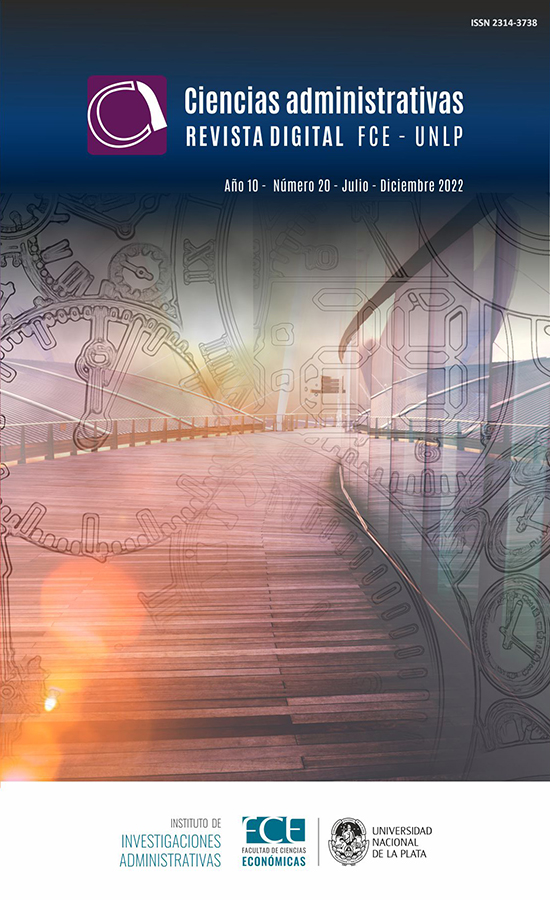From the CEO perspective: Critical competencies for effective performance
DOI:
https://doi.org/10.24215/23143738e104Keywords:
CEO, competenciesAbstract
The principal aim of this research has been to identify the critical competencies required for effective performance in the position of CEO in subsidiaries of multinational companies from the perspective of the players themselves. Eleven critical skills have been identified; the most significant of them are communication and interpersonal relationships, using a qualitative approach consisting of interviews with thirty CEOs.
Downloads
Metrics
References
Argenti, P. A. (2017). Strategic Communication in the C-Suite. International Journal of Business Communication, 54(2), 146-160. https://doi.org/10.1177/2329488416687053
Bartlett, C., Ghoshal, S., & Birkinshaw, J. (2004). Transnational Management: Test, Cases, and Reading in Cross-Border Management (4th ed.). Irwin/McGraw-Hill.
Barlett, C., & Ghoshal, S. (1992). What is a Global Manager? Harvard Business Review, 70(5), 124-132.
Berber, N., & Lekovic, B. (2018). The impact of HR development on innovative performances in central and eastern European countries. Employee Relations, 40(5), 762-786. https://doi.org/10.1108/ER-08-2017-0188
Birkinshaw, J. (2001). Chapter 14: Strategy and Management in MNE Subsidiaries. In A. M. Rugman & T. L. Brewer (Eds.), Oxford Handbook of International Business (pp. 380-401). Oxford University Press. https://doi.org/10.1093/0199241821.003.0014
Birkinshaw, J., & Hood, N. (1998). Multinational Subsidiary Evolution: Capability and Charter Change in Foreign-Owned Subsidiary Companies. Academy of Management Review, 23(4), 773-795. https://doi.org/10.5465/amr.1998.1255638
Botelho, E. L., Powell, K., Kincaid, S., & Wang, D. (2017). What Sets Successful CEOs Apart. Harvard Business Review, 95(3), 70-77.
Boyatzis, R. (1982). The competent Manager: A model for effective performance. Wiley & Sons.
Brown, O., Paz-Aparicio, C., & Revilla, A. (2019). Leader’s communication style, LMX and organizational commitment: A study of employee perceptions in Peru. Leadership & Organization Development Journal, 40(2), 230-258. https://doi.org/10.1108/LODJ-03-2018-0129
Drucker, P. (2004, December 30). The American CEO. Wall Street Journal. https://www.wsj.com/articles/SB110436476581112426
Hurd, A. R., & McLean, D. D. (2004). An analysis of the perceived competencies of CEOs in public park and recreation agencies. Managing Leisure, 9(2), 96–110. https://doi.org/10.1080/13606710410001709626
Kaplan, S., Kebanov, M., & Sorensen, M. (2012). Which CEO Characteristics and Abilities Matter? The Journal of Finance, 67(3), 973-1007. https://doi.org/10.1111/j.1540-6261.2012.01739.x
Kotter, J. (2019). What effective general managers really do. In R. Stewart (Ed.), Managerial Work (137–148). Routledge. doi:10.4324/9780429398599-8
Kouzes, T., & Posner, B. (2019). Influence of managers’ mindset on leadership behavior. Leadership & Organization Development Journal, 40(8), 829-844. https://doi.org/10.1108/LODJ-03-2019-0142
Lafley, A. (2009). What Only the CEO Can Do. Harvard Business Review, 87(5), 54-62.
Levy-Leboyer, C. (1997). Gestión de las competencias. Gestión 2000.
Maidique, M., Atamanik, C., & Perez, R. (2014). The Six Competencies of a CEO. Leader to Leader, (71), 31–37. https://doi.org/10.1002/ltl.20111
McClelland, D. C. (1973). Testing for competence rather than intelligence. American Psychologist, 28(1), 1-14. https://doi.org/10.1037/h0034092
McLean, D., Hurd, A., & Jensen, R. (2005). Using Q-methodology in competency development for CEOs in public parks and recreation. Managing Leisure, 10(3), 156–165. https://doi.org/10.1080/13606710500239012
Paksoy, M., Soyer, F., & Çalık, F. (2017). The impact of managerial communication skills on the levels of job satisfaction and job commitment. Journal of Human Sciences, 14(1), 642-652. https://doi.org/10.14687/jhs.v14i1.4259
Penley, L., Alexander, E., Jernigan, I., & Henwood, C. (1991). Communication Abilities of Managers: The Relationship to Performance. Journal of Management, 17(1), 57-76. https://doi.org/10.1177/014920639101700105
Quelch, J., & Bloom, H. (1996). The Return of The Country Manager. The McKinsey Quartlerly, (2), 30-43.
Radovic Markovic, M., & Salamzadeh, A. (2018). The Importance of Communication in Business Management. The 7th International Scientific Conference on Employment, Education and Entrepreneurship, Belgrade, Serbia. https://ssrn.com/abstract=3578378
Schein, E. (1988). La cultura empresarial y el liderazgo. Plaza & Janes.
Spencer, S. M., Rajah, T., Mohan, S., & Lahiri, G. (2008). The Indian CEOs: Competencies for success. Vision, 12(1), 1–10. https://doi.org/10.1177/097226290801200102
Spencer, L., & Spencer, S. (1993). Competence at Work. John Wiley and Sons.
Wood, J., & Vilkinas, T. (2007). Characteristics associated with CEO success: perceptions of CEOs and their staff. Journal of Management Development, 26(3), 213-227. http://dx.doi.org/10.1108/02621710710732128
Zapata, G., Mirabal, A., & Canet, M. T. (2015). El entorno de la organización: Un estudio de sus tipologías y su vinculación con la percepción directiva y el diseño organizativo. Ciencia y Sociedad, 40(4), 785-822. https://doi.org/10.22206/cys.2015.v40i4.pp785-822
Additional Files
Published
How to Cite
Issue
Section
License
Copyright (c) 2022 Fernando Troilo

This work is licensed under a Creative Commons Attribution-NonCommercial-ShareAlike 4.0 International License.
Those authors who have publications with this journal, agree with the following terms:
a. Authors will retain its copyright and will ensure the rights of first publication of its work to the journal, which will be at the same time subject to the Creative Commons Atribución-NoComercial-CompartirIgual 4.0 Internacional (CC BY-NC-SA 4.0) allowing third parties to share the work as long as the author and the first publication on this journal is indicated.
b. Authors may elect other non-exclusive license agreements of the distribution of the published work (for example: locate it on an institutional telematics file or publish it on an monographic volume) as long as the first publication on this journal is indicated,
c. Authors are allowed and suggested to disseminate its work through the internet (for example: in institutional telematics files or in their website) before and during the submission process, which could produce interesting exchanges and increase the references of the published work. (see The effect of open Access)





































